
Johns Hopkins University today unveiled specific steps it plans to take to cultivate and support a culture of innovation and entrepreneurship and respond to the strategic challenges detailed in last year's committee report on the topic.
The implementation plan, the release of which was announced today to the university community in a message from JHU President Ronald J. Daniels, addresses the 22 specific recommendations to bolster the university's innovation initiatives that were included in the May 2014 innovation report.
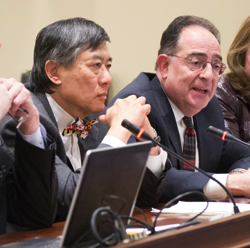
Maryland’s road to a stronger high-tech economy lies at the intersection of its I-95 and I-270 corridors. Better integration of education, research and development in the state’s two biggest innovation centers—the Washington suburbs and Baltimore—will spur success. This is underway.
In less than three years, a strategic collaboration between the University of Maryland, College Park and the University of Maryland, Baltimore, called “MPowering the State,” has dramatically energized technology development along these corridors.

For the second year, The Johns Hopkins University and Johns Hopkins Medicine are co-sponsoring an opportunity that prepares health information technology startups to present their innovative ideas to the world. DreamIt Health Baltimore is a four-month intensive boot camp program for entrepreneurs, designed to accelerate new product development for health IT startup companies. The program provides six new startups with access to top-tier legal and accounting services, along with opportunities to meet and pitch to angel investors and venture capitalists. Each startup also receives additional seed capital of up to $50,000.

Italian drugmakers Alfa Wasserman and Sigma-Tau said on Thursday they had agreed to merge pharmaceutical activities to create a domestic champion with sales of more than 900 million euros ($992 million).
In October sources told Reuters the two companies were in advanced talks to combine their Italian operations.
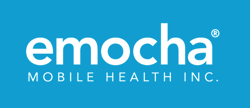
Baltimore health IT startup Emocha Mobile Health Inc. is taking its medication-tracking mobile app to one of the largest counties in the country — Harris County, Texas. Emocha on Friday announced a year-long, $65,000 contract with the Houston-area county to help health workers make sure tuberculosis patients are taking their medication. The contract can be extended for up to a total of five years.

BIO is surveying members and non-members on their interactions with the FDA during the various stages of drug development prior to submitting an NDA/BLA. The survey can be accessed here.
Why is it important for you to share your feedback? In an increasingly competitive and fiscally-constrained environment, it is more important than ever for all stakeholders to work together to promote effective R&D for innovative medicines.

MorphoSys AG (FSE: MOR; Prime Standard Segment, TecDAX, OTC: MPSYY) and Emergent BioSolutions Inc. (NYSE: EBS) today announced the initiation of a Phase 1 clinical study to evaluate the safety, tolerability, and clinical activity of MOR209/ES414 in patients with metastatic castration-resistant prostate cancer (mCRPC). Under the terms of the companies' co-development and commercialization agreement, the achievement of this milestone triggers a payment of US $ 5 million by MorphoSys to Emergent.

The total potential payout for the winner will be $2 million — pocket change for the biggest defense company on the globe. And yet, Lockheed Martin Corp. is leading one of 25 teams in the Defense Advanced Research Projects Agency's annual Robotics Challenge. And it's the only large contractor to do so.
The teams will vie for a chance to win one of three cash prizes totaling $3.5 million at the DARPA Robitics Challenge finals — the second crop of 14 teams, many of which are international, was just added last week. The finals, which will take place June 5-6 at Fairplex in Pomona, California, will require robots to attempt a circuit of consecutive physical tasks, with degraded communications between the robots and their operators.

Baltimore Mayor Stephanie Rawlings-Blake's State of the City Address will take on economic issues Monday, touting job creation and introducing initiatives like a $1 million innovation fund, doubled Small Business Resource Center budget and new online maps tracking development projects. Expect the mayor to compare economic conditions in the city today to those that existed when she first took office in 2010. She plans to note a drop in unemployment and a rise in jobs before pitching new and expanded programs geared toward boosting businesses, city officials said.
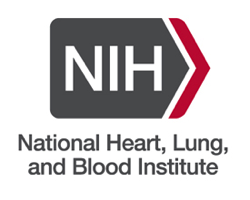
Next Due Date June 19, 2015; Submit Your Letter of Intent by May 19, 2015 Informational Webinar Coming Soon – Stay Tuned!
NHLBI’s Phase IIB Bridge Award provides up to $3M to support the continued development of your innovative technology requiring regulatory oversight. Applicants are expected to leverage NHLBI funding to attract matching third-party financing. For NHLBI-related technologies focused on rare diseases or pediatric populations, the Phase IIB Small Market Award (RFA-HL-14-012) provides up to $3M, with an expectation of partial matching funds from third-party investors. The next due date for RFA-HL-14-012 is June 19, 2015. Both Phase IIB programs are open to Phase II SBIR or STTR awardees from any agency.

Johns Hopkins University officials have been talking about putting more energy into fostering more entrepreneurship among the Baltimore institution’s vast research megalith. This week, they put a plan in writing.
On Wednesday, Hopkins President Ronald J. Daniels released a 20-page report that lays out plans for $40 million in new investment over five years. Officials want the new money to fuel the growth of an “innovation ecosystem.”

Google has been making major waves in healthcare lately, with a significant change in how it displays health search results in a collaboration with the Mayo Clinic that may include a change to its algorithms.
And efforts to make Google Glass more applicable to healthcare seem to be increasing. But that’s far from the only area it intends on disrupting. The folks at HIT Consultant put together this handy infographic that details the potential dominance, or at least influence, ranging from genomics to diagnosis to wearables.
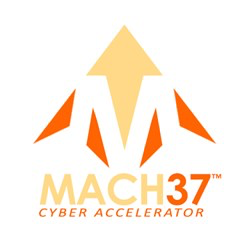
Mach37, the CIT-backed accelerator for cybersecurity startups, has announced its spring cohort of investments. The companies include services ranging from risk tracking to system immunization and firewalling — your usual cybersecurity shenanigans.
The Herndon-based accelerator invests $50,000 in each of its startups and provides network access and guidance toward each company's development. The portfolio includes 22 companies as of this announcement.

AstraZeneca has completed the acquisition of Actavis’ branded respiratory business in the US and Canada for an initial consideration of $600m.
The deal strengthens AstraZeneca's aclidinium respiratory franchise and builds on the acquisition of Almirall's respiratory portfolio in 2014 by extending the company's development and commercialization rights into the US for both Tudorza Pressair and Duaklir Genuair.

This spring, the InvestMaryland Challenge will award four $100,000 grand prizes to innovative young companies with the potential to flourish in Maryland.
Now in its third year, this national seed and early-stage business competition, hosted by the Maryland Department of Business and Economic Development, has accepted hundreds of applications since fall 2014. Judges have now narrowed the field to just 46 companies, including the competition’s first-ever international semifinalist, Israel-based AcceleRadio. This month, they will present their business plans during face-to-face interviews with panels of three to five judges. Final reviews will take place in April.

The Johns Hopkins University Montgomery County Campus welcomes Leidos to the campus community. Leidos has located some of its employees in Building III, putting them in close proximity to the National Cancer Institute Shady Grove, located right next door. Leidos Biomedical Research and the National Cancer Institute have a contract to work together on “genetics and genomics, proteins and proteomics, advanced biomedical computing and information technology, biopharmaceutical development and manufacturing, nanotechnology characterization, and clinical trials management,” according to NCI.

Today at Henderson’s Wharf Inn in Fells Point, U.S. Senator Barbara A. Mikulski (D-Md.) announced she has decided not to run for re-election. Senator Mikulski, who will complete her 5th term in office in January, 2017, says she wants to focus for the next two years on working for her constituents and for the nation.
“Because every day, I want to wake up thinking about you -- the little guys and gals, the watermen, automobile workers, researchers, small business owners and families,” Senator Mikulski said. “I want to give you 120 percent of my time with all of my energy focused on you and your futures. Because it’s always been about you, never about me. That’s what it takes to be a good senator by my expectations and by my standards.”

Cambridge, Massachusetts-based Mersana Therapeutics Inc, a provider of Fleximer antibody-drug conjugate technology, has secured $35 million in Series B-1 financing. New Enterprise Associates led the round with participation from Rock Springs Capital Management, Elliott Sigal, former head of R&D at Bristol-Myers Squibb, Pfizer Venture Investments and Fidelity Biosciences. Also, Mersana has appointed Anna Protopapas as president and CEO. And, Protopapas and Dr. Elaine V. Jones, executive director of Pfizer Venture Investments, have been added to Mersana’s board of directors.

On Feb. 19, the U.S. Food and Drug Administration took a huge step towards patient-centric medicine when it approved the marketing of genetics testing company 23andMe’s carrier test for Bloom Syndrome. This was a startling — and good — development because it affirmed the rights of consumers to drive their own health-care decisions and procedures. But it also means that it has become urgent to develop policies to regulate the rights of companies to resell data derived from the contents of our DNA and from our medical records.
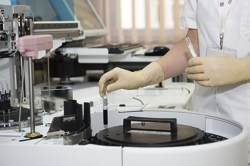
Where will the first $1 trillion company come from? Some think it is already in the making, but not visible yet. The future is all around us and innovators can see it more than the rest of us.
As suggested, a convergence of technologies, including the Internet of Things, AI, robotics and synthetic biology, might just make a health company the first to be the Trillion Dollar Unicorn.

The interest in adopting digital health tools such as clinical wearables and smartphone diagnostics has been hindered in some ways by the rapid growth in the number of these devices and relatively little clinical validation. GE Ventures and Stanford Health Care have partnered to launch a company called Evidation Health to validate and optimize digital health tools, according to a company statement.

Funding and Research Opportunities
The following funding opportunity announcements from the NHLBI or other components of the National Institutes of Health, might be of interest:
Notices:
- Eye on NIH Policy: OMB Uniform Guidance - What it Means for NIH & You (Video & Interactive Q&A - March 12, 2015)
- NCCIH Policy for Submission of R21 Applications Containing Clinical Trials
- (NOT-AT-15-004)
-
National Center for Complementary and Integrative Health
Requests for Applications:
- Mobilizing Research: A Research Resource to Enhance mHealth Research (U2C)
- (RFA-OD-15-129)
Office of Behavioral and Social Science Research
- National Heart, Lung, and Blood Institute
- National Institute on Alcohol Abuse and Alcoholism
- National Institute of Biomedical Imaging and Bioengineering
- National Institute of Neurological Disorders and Stroke
- Application Receipt Date(s): May 08, 2015
Please note that most links to RFAs, PAs, and Guide Notices will take you to the NIH Web site. RFPs will take you to FedBizOpps. Links to RFPs will not work past their proposal receipt date. Archived versions of RFPs posted on FedBizOpps can be found on the FedBizOpps site using the FedBizOpps search function. Under “Document to Search,” select Archived Documents.

Aura Biosciences, a biotech company developing highly tumor-targeted breakthrough therapies for rare cancers, has secured a $21M Series B round of funding. The financing was led by Advent Life Sciences, with participation from new investors, Chiesi Ventures, Ysios Capital, and Alexandria Venture Investments. Existing investors, including LI-COR Biosciences and Henri Termeer, former Chief Executive Officer of Genzyme, also participated in the financing. The financing will be used to advance Aura’s unique and novel therapies into clinical trials for the treatment of rare cancers of the eye, and to further develop for additional cancer indications its first-in-class technology that was discovered and developed in partnership with Dr. John Schiller at the National Cancer Institute (NCI).

Symbiomix Therapeutics, a late-stage, privately held biopharmaceutical company developing innovative medicines for serious women's health infections, today announced results from its Phase 1 clinical program demonstrating that its lead product candidate, SYM-1219, was safe and well tolerated and had predictable pharmacokinetics (PK), and that contraceptive efficacy for birth control pills would not be altered by SYM-1219 administration.
These results will be presented on March 6th at the annual meeting of the American Society of Clinical Pharmacology and Therapeutics (ASCPT), which takes place in New Orleans from today through March 7th. Following are the details for the two posters presenting the study results: